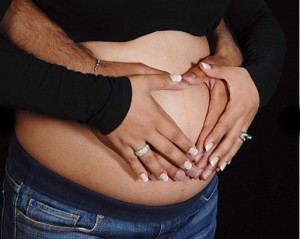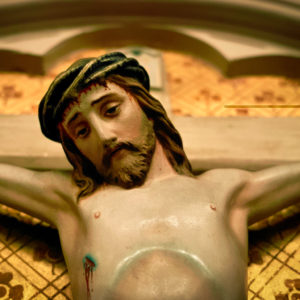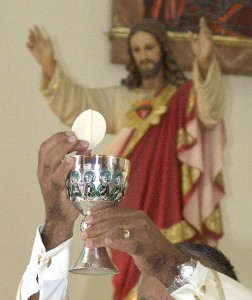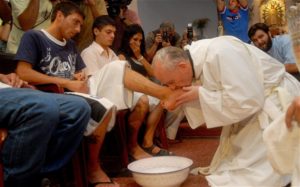
The Womb: Honing Humility
When Jesus chose to enter into human history, to come into our world, he did not do it ostentatiously in a miraculous display of power and glory, but rather in humility and meekness. Although he brought with him the salvation of the world he accepted that he would enter into our human condition, and although he possessed the power and ability to command the forces of nature he chose as his gateway into our lives the womb of a young woman. This wasn’t an open and shut situation, but a process. And even though the narrative of this process in Sacred Scripture is quick and simple, I think it’s important to really reflect on what went on during this time.
Jesus spent nine months in his mother’s womb. Not only does his patience bear witness to his commitment to bring true love to our fallen nature and broken humanity, by his willing to wait for the time to be right, but his total dependence on his mother, Mary, as his only source of comfort, nourishment, and protection shows a certain level of weakness and vulnerability on his part. Not weakness in the sense that he didn’t have the power to do it any other way, in fact the beauty lies in the fact that he chose to make himself weak and that is also a challenge to us.
If being a Christian is to be Christ-like, then we too must allow ourselves to be vulnerable as love often requires of us. When we live the Gospel we do become vulnerable and we put ourselves out there for others, especially those most in need. When we love we offer ourselves not knowing or even caring whether that gesture will be reciprocated or even appreciated. Sure there is a chance that we might be rejected or even hated, but these things shouldn’t surprise us since Jesus told us that this would happen. The powerful lesson that we learn in our vulnerability is that when we step outside of our comfort zone, unprotected, unsure of what will happen, then and only then are we relying or better yet depending on God’s grace. He becomes our only source of comfort, nourishment, and protection. This is when we can say with St. Paul:
“For when I am weak, then I am strong.”
Realistically, I know that this idea of dependence is something that makes us extremely uncomfortable, and that is sort of the point. We want to depend on nobody but ourselves, to expect no help from others, to go it on our own. However, I would say that Jesus has shown us that this is not the best way to live. We as a people are dependent on each other and on God as the ultimate source of life and of love.

The Cross: The Power of Weakness
This same theme of vulnerability and weakness continue in our reflection on Jesus as we enter into the mystery of the cross. The cross is weakness at it’s best. The cross is the climactic expression of true love. The reason Jesus was able to carry the cross to Golgatha was a direct result of what happened in the Garden of Gethsemane. It is because he was able to become weak, to prostrate himself, to put his his face to the ground, to accept and more importantly to desire the will of God above his own.
“Not my will but yours be done.”
By making himself weak, by dying to himself, he was able to accept the will of God, which in his case was the cross. This is where the difficulty lies. This was the real battle. This is why he was able to make that journey to Golgotha, because it wasn’t about him anymore. It wasn’t that what he wanted didn’t matter anymore, but that what he wanted had now become what God wanted, the salvation of the world.
Dying to ourselves is just as painful as it sounds. For your sweat to turn to blood, to carry your cross, and to give your life for others is no easy task. It requires the ability to make yourself vulnerable and in your weakness God’s glory can shine. Jesus made himself weak to the will of God and in ultimate vulnerability gave himself into our hands. We killed him, but by the power of God he rose again!
The same is true for us, not that we should seek to literally be nailed to a cross, but in expressing our love we must give ourselves in complete vulnerability into the hands of our beloved. We cannot expect anything in return or even that our love, the gift of ourselves, will be accepted. We love for love itself.

The Altar: Vulnerability as an Expression of Love
Finally, we have the altar, the stage, or the table on which Jesus comes to us each and every day in the Eucharist. Yet again we see humility. Just as he depended on Mary in the womb, just as he allowed himself into the hands of the soldiers, again in the Eucharist he becomes weak and vulnerable, totally dependent on us.
The host, a piece of unleavened bread, is not exactly a safe place. The host is delicate and weak. This requires the utmost care and reverence on our part. Jesus in the Eucharist is completely dependent on our care, he gives himself completely into our hands.
But it is only because of this vulnerability that we are able to enter into the mystery of our faith, to become one with the Risen Christ. He enters into us literally, only when we too are able to fall to our knees and admit that we need him.
“Behold the Lamb of God, behold him who takes away the sins of the world. Blessed are those called to the supper of the Lamb.”
~ Invitation to Communion (Order of Mass)
We respond in humility, in words of weakness: “Lord, I am not worthy that you should enter under my roof, but only say the word and my soul shall be healed.” This in essence is our own Gethsemane. This is when we die to ourselves, admitting our unworthiness, and make room for not only God’s will, but God himself who enters into us and becomes one with us. Just as when a husband and wife give themselves freely over to each other, it requires that they be totally vulnerable, trusting in the other their entire selves.
“To love someone is to give them the ability to hurt you, but to trust them not to.”
~ Unknown
Humility, Weakness, and Vulnerability
These are the key to love, to the Christian way of life, to personal holiness. Obviously, it is no easy task, but as we’ve explored here it’s not supposed to be easy. Love hurts. But it also heals and transforms. The saints who have followed this way of humility, weakness, and vulnerability inspire us for that reason. I think of people like St. Francis of Assisi, St. Therese of Lisieux, and Blessed Mother Teresa as powerful examples of holiness and possessers of these divine qualities.

Our new Holy Father Pope Francis has shown in only the first few days of his pontificate these sames characteristics of Christ and by his example, by his witness to Christ the world has become mesmerized and drawn closer to God. That’s what being a Christian is all about, being a reflection of the love of Jesus Christ.
Prayer is essential in the quest to obtain them and the place where we can best practice our weakness and vulnerability. But pray like Jesus prayed in the Garden of Gethsemane. Pray like your life depended on it. Pray out of love. God bless you.